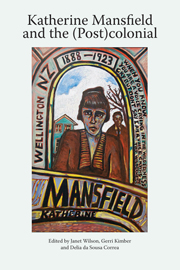Book contents
- Frontmatter
- Contents
- List of Illustrations
- Acknowledgements
- Colophon
- Introduction
- Criticism
- Creative Writing
- Reports
- The Lawrences, Katherine Mansfield and the ‘Ricordi’ Postcard
- ‘A Little Episode’: The Forgotten Typescripts of Katherine Mansfield, 1908–11
- The 2012 Alexander Turnbull Library Mansfield/Murry Acquisition
- Two French Books Belonging to Katherine Mansfield
- Editing the New Collected Fiction of Katherine Mansfield, 2 vols (Edinburgh: Edinburgh University Press, 2012), Gerri Kimber and Vincent O'Sullivan, eds
- Names Painting – Katherine Mansfield
- Reviews
- Notes on Contributors
- Katherine Mansfield Society
‘A Little Episode’: The Forgotten Typescripts of Katherine Mansfield, 1908–11
from Reports
Published online by Cambridge University Press: 05 March 2014
- Frontmatter
- Contents
- List of Illustrations
- Acknowledgements
- Colophon
- Introduction
- Criticism
- Creative Writing
- Reports
- The Lawrences, Katherine Mansfield and the ‘Ricordi’ Postcard
- ‘A Little Episode’: The Forgotten Typescripts of Katherine Mansfield, 1908–11
- The 2012 Alexander Turnbull Library Mansfield/Murry Acquisition
- Two French Books Belonging to Katherine Mansfield
- Editing the New Collected Fiction of Katherine Mansfield, 2 vols (Edinburgh: Edinburgh University Press, 2012), Gerri Kimber and Vincent O'Sullivan, eds
- Names Painting – Katherine Mansfield
- Reviews
- Notes on Contributors
- Katherine Mansfield Society
Summary
In the summer of 1908, not yet twenty years old but determined to become a successful writer, Katherine Mansfield left New Zealand and sailed for England. It was the second time she had made such a journey. The daughter of Harold Beauchamp, the wealthy Wellington banker, Mansfield was sent to Queen's College School in London between 1903 and 1906 to complete her education. In this time she learnt French and German, bought fashionable clothes and styled her hair, devoted herself to playing the cello, wrote stories for the school magazine, and developed an obsession for the works of Oscar Wilde. Compared to the provincial tedium of life in New Zealand, London represented a space of self-development for Mansfield and was indelibly connected in her mind with the fiercely protected independence she considered necessary for becoming a writer. Despite her early optimism, however, the immediate years following Mansfield's return to London in 1908 proved to be one of the most painful periods in her life.
As a teenager, Mansfield had fallen in love with a young cellist named Arnold Trowell. Arnold's virtuosity overshadowed the talent of his twin brother Garnet, a less attractive and more retiring violinist. The twins left New Zealand together in 1903 to study in Germany and at the Brussels Conservatoire before moving to London to join their family, who had since relocated there. Mansfield regularly wrote to her ‘Caesar’ – the nickname she gave to Arnold – and nurtured fantasies of their future life together.
- Type
- Chapter
- Information
- Katherine Mansfield and the (Post)colonial , pp. 154 - 166Publisher: Edinburgh University PressPrint publication year: 2013



